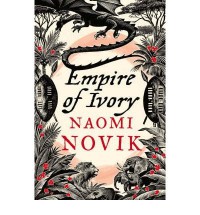Empire of Ivory - Naomi Novik

Apparently I am still in the depths of my reading slump, because I have no strong feelings about this book. Potentially this is because I read it in dribs and drabs, in the snatched half-hour before work, which doesn't give me much of a chance to get into it. I don't know.
Laurence and Temeraire head off to Africa in this fourth Temeraire novel, searching for a cure for a virulent dragon plague that is leaving England vulnerable to Napoleon's invasion plans. There is slavery. This is A Bad Thing. The English are nasty to dragons. This is also A Bad Thing.
Subtle Empire of Ivory is not.
Temeraire, it has to be said, is still awesome and adorable, and Novik's prose is still authentically Napoleonic. (Or it feels that way, anyway.) There's some interesting bits about feminism - one of the lady aviators gets pregnant without being married, which, scandal - and some bits that make you want to punch the British public ("Have you no pity, Africa?" HAVE YOU NO FUCKING PITY, ENGLAND), but I kind of feel that it's all quite - obvious? I miss Novik's careful delineation of Regency relationships, full of give and take and coded insults, which take a seat further and further back as Laurence becomes more and more cut off from wider society as a member of the Aerial Corps. I'm quite prepared to accept that this might be the point - that the trajectory of this series is delineating a move from collective, social thinking to the Romantic cult of the individual, from collective morality to individual conscience, but we already have so many Romantic narratives that it would have been nice to see some more Regency ones - narratives about people who weren't perhaps so closely aligned to our values today.
(I'm not, of course, trying to argue that slavery was in any way A Good Thing, but I don't think stories that just rehash the point that it was very very bad and only very very bad people upheld it, without thinking about why otherwise reasonable people might have accepted it or focusing at all on its filthy and terrible realities are helpful to cultural discourse around it.)
 3
3
 2
2


